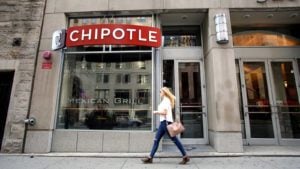Which brings up the second point. Cash-cow stocks tend to have high institutional investment rates or, at the very least, specific stakeholders with a ton of capital have a significant say in how the company runs things.
Bring both traits €”free cash flow and institutional ownership €”together and have a cash-cow stock. Specifically, institutional investors with significant positions in the company can lean on management to use free cash flow to buy back shares, boosting per-share pricing and giving the same investors a healthy profit with fewer tax implications than, say, dividend distributions. If you ever see a seemingly banal stock with massive per-share pricing, chances are it’s a cash-cow company.
Chipotle (CMG)

Chipotle (NYSE:CMG) is one of the top cash-cow stocks and is an example of the entire concept. Priced at more than $2,600 per share, many retail investors may come away from initial analysis shocked that the higher-end fast food retailer’s stock price is so high. But, from a cash-cow perspective, it makes perfect sense.
The company’s free cash flow per share is consistently high, averaging $12.26 over the past five quarters, with the most recent period’s €””just” $3.41 per share €”dragging down the rest. Excluding the comparatively poor performance, CMG stock’s free cash flow per share was a massive $14.48 between 2022’s third quarter and the same period in 2023. And, like all cash cow stocks, CMG has massive institutional ownership at more than 90%.
Chipotle’s highest-profile investor is Bill Ackman, through his investment firm Pershing Square Capital Management, which owns a 3% stake in the company. With a consistently high buyback rate over the past five years €”excluding a brief period during the pandemic €”Ackman’s investment is paying off massively. Moreover, the trend isn’t set to stop anytime soon, as the company just announced another $200 million repurchasing round.
Booking Holdings (BKNG)

Known for its portfolio of travel-based services, including Priceline and Kayak, Booking Holdings (NASDAQ:BKNG) is another cash-cow stock with a surprisingly high share price north of $3,500. Though free cash flow per share dipped recently, BKNG averaged a whopping $61.60 ratio over the past 12 months’ reporting periods. Likewise, institutional owners hold more than 92% of the company and are likely a major factor in the firm’s 8.96% total yield €”of which dividends are just 0.25%.
Analysts project further growth ahead for Booking Holdings as the global travel market finally breaks free from the post-pandemic slump. That’s evident from the company’s most recent earnings report, which saw quarterly gross travel bookings climb 16% year-over-year (YoY) and the same stat bump up 24% annually. Likewise, annual income increased 40% on the heels of a 25% revenue hike €”meaning management is effectively navigating higher interest rates and improving profit margin via diligent cost control.
AutoZone (AZO)

AutoZone (NYSE:AZO) is well-loved by auto enthusiasts, but the cash-cow stock is also an institutional investor favorite at a 93% ownership rate and a $3,000 share price. True to form for our cash-cow contingent, free cash flow per share averaged $39.96 over the past five periods with fewer peaks and valleys than CMG and BKNG.
The company marked a record-setting period and an all-time high after a fantastic second-quarter earnings release. Across the board, AZO’s financials topped past results and expectations. Earnings per share hit $28.89 (more than a $4 bump YoY) while revenue and profit margin both expanded, even as the company had “a difficult holiday comparison for both Christmas and New Year’s” in terms of sale volume.
AutoZone also added a handful of new stores to its portfolio, raising the total retail count to 7,191. With 26 new stores cutting into cash flow but soon operating at full speed, expect free cash flow per share to climb further as each store jumps on the AutoZone flywheel.
On the date of publication, Jeremy Flint held no positions in the securities mentioned. The opinions expressed in this article are those of the writer, subject to the InvestorPlace.com Publishing Guidelines.
Jeremy Flint, an MBA graduate and skilled finance writer, excels in content strategy for wealth managers and investment funds. Passionate about simplifying complex market concepts, he focuses on fixed-income investing, alternative investments, economic analysis, and the oil, gas, and utilities sectors. Jeremy’s work can also be found at www.jeremyflint.work.
